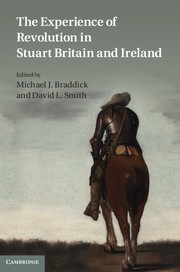Book contents
- Frontmatter
- Contents
- Notes on contributors
- Preface
- List of abbreviations
- JSM
- Introduction: John Morrill and the experience of revolution
- 1 The Scottish–English–Romish Book: the character of the Scottish Prayer Book of 1637
- 2 Popery in perfection? The experience of Catholicism: Henrietta Maria between private practice and public discourse
- 3 Sir Benjamin Rudyerd and England's ‘wars of religion’
- 4 Rhetoric and reality: images of Parliament as Great Council
- 5 Cathedrals and the British Revolution
- 6 History, liberty, reformation and the cause: Parliamentarian military and ideological escalation in 1643
- 7 Sacrilege and compromise: court divines and the king's conscience, 1642–1649
- 8 Law, liberty, and the English Civil War: John Lilburne's prison experience, the Levellers and freedom
- 9 On shaky ground: Quakers, Puritans, possession and high spirits
- 10 James Harrington's prescription for healing and settling
- 11 ‘The Great Trappaner of England’: Thomas Violet, Jews and crypto-Jews during the English Revolution and at the Restoration
- 12 The Cromwellian legacy of William Penn
- 13 Irish bishops, their biographers and the experience of revolution, 1656–1686
- 14 Religion and civil society: the place of the English Revolution in the development of political thought
- Bibliography of the major writings of John Morrill, 1967–2009
- Index
8 - Law, liberty, and the English Civil War: John Lilburne's prison experience, the Levellers and freedom
Published online by Cambridge University Press: 05 August 2011
- Frontmatter
- Contents
- Notes on contributors
- Preface
- List of abbreviations
- JSM
- Introduction: John Morrill and the experience of revolution
- 1 The Scottish–English–Romish Book: the character of the Scottish Prayer Book of 1637
- 2 Popery in perfection? The experience of Catholicism: Henrietta Maria between private practice and public discourse
- 3 Sir Benjamin Rudyerd and England's ‘wars of religion’
- 4 Rhetoric and reality: images of Parliament as Great Council
- 5 Cathedrals and the British Revolution
- 6 History, liberty, reformation and the cause: Parliamentarian military and ideological escalation in 1643
- 7 Sacrilege and compromise: court divines and the king's conscience, 1642–1649
- 8 Law, liberty, and the English Civil War: John Lilburne's prison experience, the Levellers and freedom
- 9 On shaky ground: Quakers, Puritans, possession and high spirits
- 10 James Harrington's prescription for healing and settling
- 11 ‘The Great Trappaner of England’: Thomas Violet, Jews and crypto-Jews during the English Revolution and at the Restoration
- 12 The Cromwellian legacy of William Penn
- 13 Irish bishops, their biographers and the experience of revolution, 1656–1686
- 14 Religion and civil society: the place of the English Revolution in the development of political thought
- Bibliography of the major writings of John Morrill, 1967–2009
- Index
Summary
The historical significance of the Levellers has been the subject of long-standing controversy. There is arguably no prevailing scholarly consensus on the Levellers and their role in the development of Anglo-American constitutionalism or the emergence of liberal democracy in the West. Historians and historians of political thought have portrayed them variously as proto-proletarian revolutionaries, proto-democrats, proto-liberals, ideologues of possessive individualism and, more recently, as advocates of a populist form of civic republicanism. Liberals, neo-liberals, Marxists and neo-Marxists have obsessed over them, while revisionists have disparaged or dismissed them in their efforts to recast England's troubles of the mid-seventeenth century, not as an ideologically driven contest for sovereign power or a struggle for liberty, but as a catastrophic breakdown in a hitherto successfully functioning system of monarchical government. Indeed, for the revisionism of the 1970s the significance of the Levellers lay largely in their insignificance. However, as the first popular political ‘movement’ to advocate the establishment of a written constitution, liberty of conscience, the extension of the franchise to all male heads of households and concomitantly the abolition of most property requirements, they remain an important object of historical enquiry.
This chapter addresses the writings of the Leveller leader John Lilburne (1614?–1657) during the mid to late 1640s. During this period Lilburne either wrote from his prison cell or under the imminent threat of arrest and imprisonment; for Lilburne, the experience of revolution was largely the experience of incarceration.
- Type
- Chapter
- Information
- The Experience of Revolution in Stuart Britain and Ireland , pp. 154 - 171Publisher: Cambridge University PressPrint publication year: 2011
- 2
- Cited by



